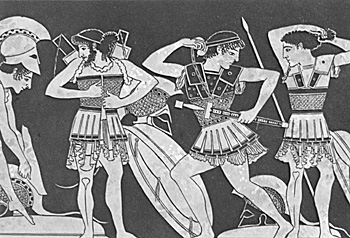 New author Godfrey Hutchinson in Xenophon and the Art of Command writes about one of the earliest great military strategists, and sheds light on the success and failures of the armies of the Ancient World by means of careful study of contemporaneous source material. Includes reference to Xenophon's own and classic Anabasis.
New author Godfrey Hutchinson in Xenophon and the Art of Command writes about one of the earliest great military strategists, and sheds light on the success and failures of the armies of the Ancient World by means of careful study of contemporaneous source material. Includes reference to Xenophon's own and classic Anabasis.
Hoplites arming for battle, the jacket illustration for Xenophon and the Art of Command (courtesy of Peter Connolly).
Godfrey Hutchinson, a classical historian specialising in Hellenistic warfare writes in his Introduction:
"There is none better to look to than Xenophon for an insight into the roles fulfilled by a commander in the first half of the fourth century BC. His background of personal command, close relationships with other commanders of note such as Agesilaos, Teleutias, Sphodrias, Thibron, Archidamos, etc., makes his writings a rich vein to mine.
The purpose of this study is to examine those aspects of command which are recurrent in his writings and reflect those which he and obviously his contemporaries thought important for anyone undertaking the role of a commander. Examples of good and bad practice abound and Xenophon's evaluations of them are highlighted. The approach is thematic rather than chronological so that comparisons between sections of the text and themes can more easily be made. As a result, differing aspects of the same action are often explored across a range of themes so that the fourth century benchmark for good command is clarified.
Direct scrutiny of contemporaneous source material is essential so that a valid picture emerges. To the modern reader some of the themes under which the examination of source material is carried out may come as a suprrise. Piety, for example, can often be overlooked as a major day-to-day concern of the Ancient World.
In addition frequent reference is made to another early writer Sun Tzu, a near contemporary of Xenophon and a Chinese general whose views bear remarkable similarity to those investigated here. This may appear strange in a text which is dealing with a fifty-year period of Greek warfare but both are important as early writers on military theory. To compare similar viewpoints a half a world apart reinforces the notion that fundamental principles have a universality whatever the context.
Nothing is new in the principles of warfare or in the decisions facing a commander engaged in operations. It is only their applications which differ. Throughout historic times parallels can be made between actions which took place many centuries apart, the only differences being the technology and the differing weapon systems employed, and the skills of the commander. Whether an action is one of offence or defence or simply one of delay, the same considerations are addressed in the pursuit of a successful outcome."
Back to Greenhill Military Book News No. 102 Table of Contents
Back to Greenhill Military Book News List of Issues
Back to Master Magazine List
© Copyright 2000 by Greenhill Books
This article appears in MagWeb (Magazine Web) on the Internet World Wide Web.
Other military history articles and gaming articles are available at http://www.magweb.com